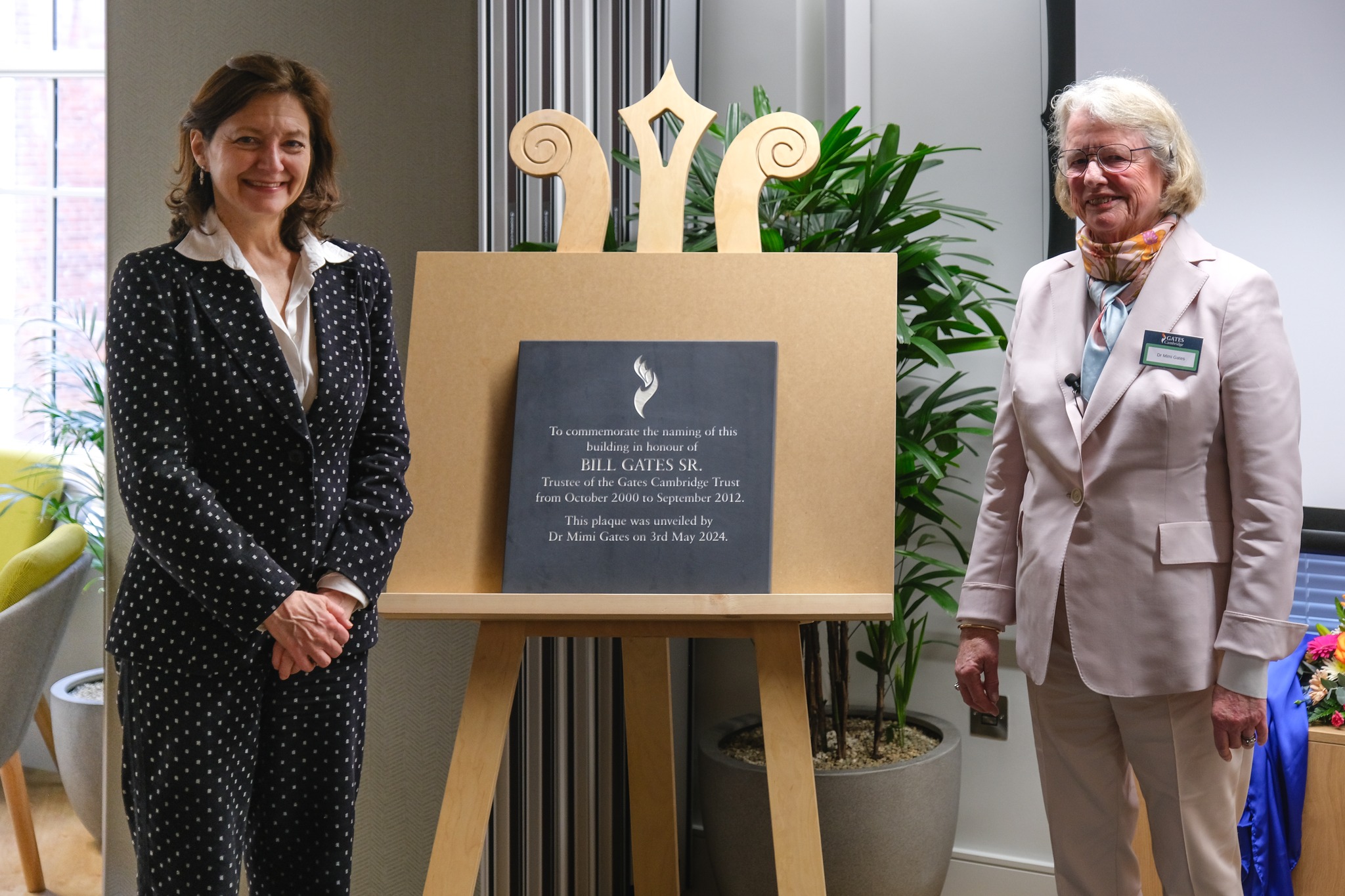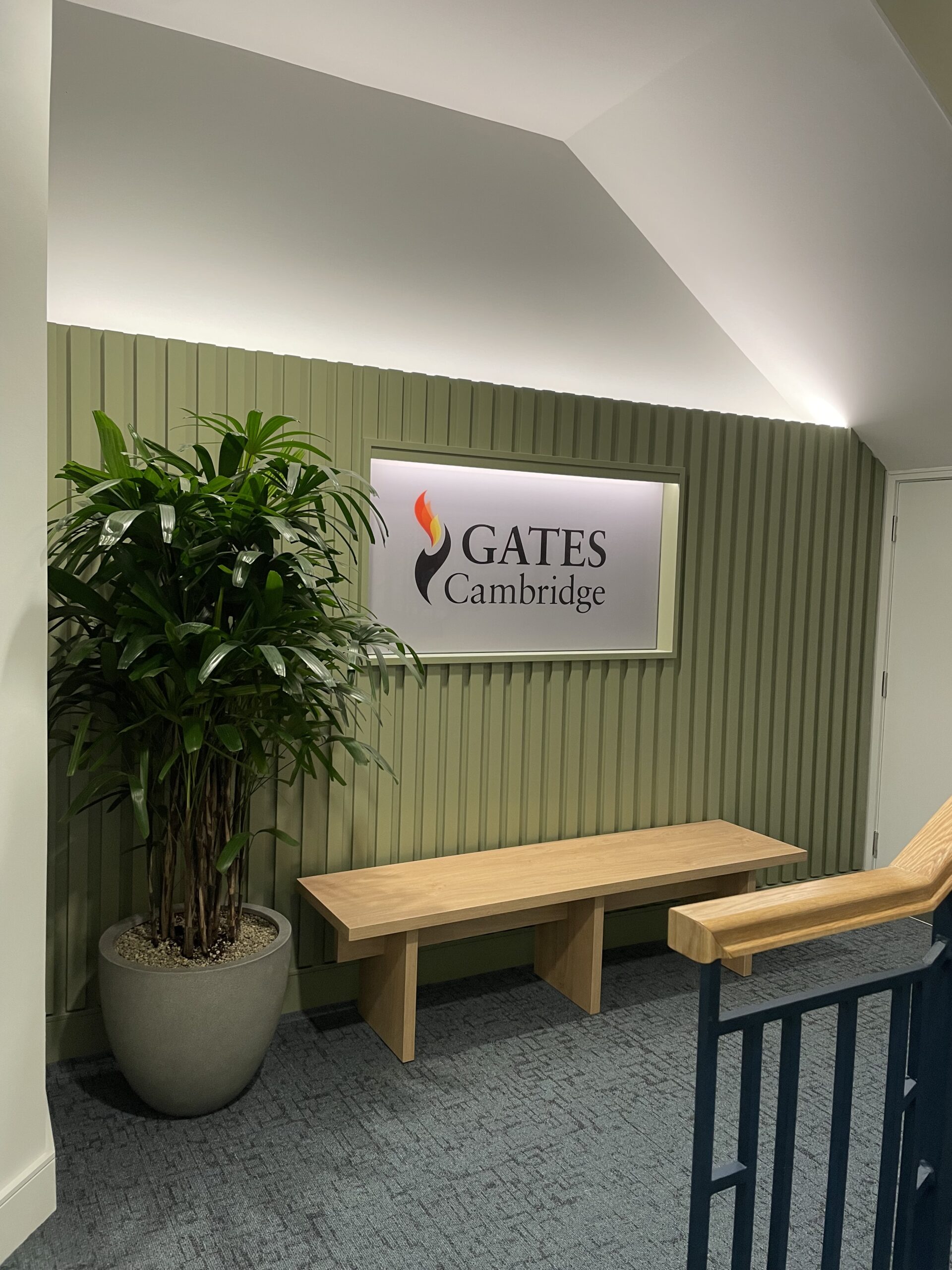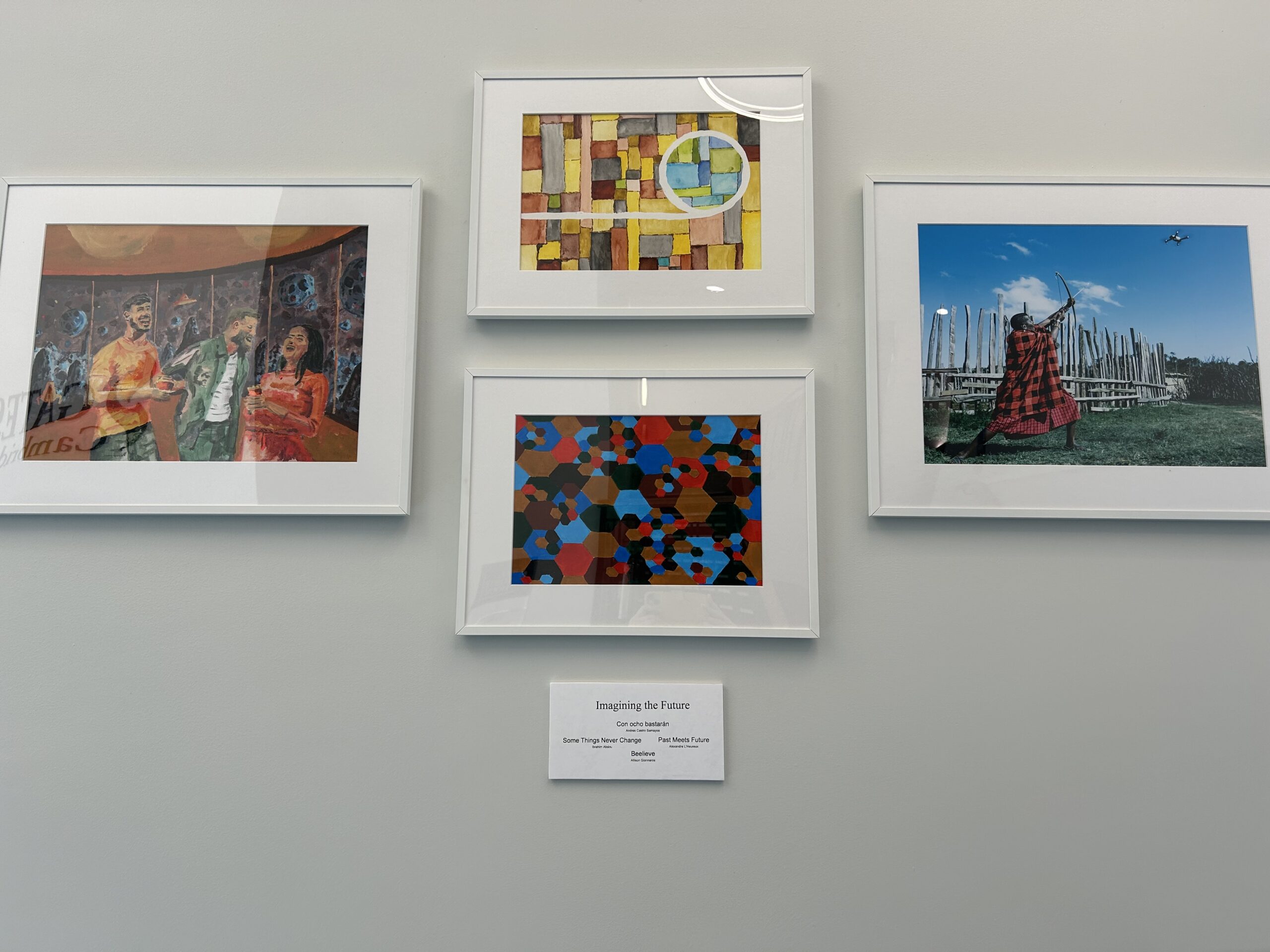
The new Bill Gates Sr House was officially opened on Friday with a host of Scholars, Trustees and members of the Gates Cambridge family
If Bill was here he would have said this is awesome. That was the word he used to describe the Gates Cambridge Scholars. He would be happy, honoured and humbled to have this historic, renovated building bear his name.
Mimi Gates
The Gates Cambridge family celebrated the opening of the new Bill Gates Sr. House last week.
Former Provosts, Vice-Chancellors, trustees, staff and Gates Cambridge Scholars from across the years as well as representatives from the Bill & Melinda Gates Foundation gathered to inaugurate the new state-of-the-art building which brings together scholars and staff for the first time.
The day kicked off with presentations from six scholars. Emma Soneson [2018] spoke about her ongoing work on mental health and education based on her PhD on adolescent and child mental health during Covid. This found that a third of young people felt their mental health had improved during the first cohort, contradicting overwhelmingly negative press reports.
She said it is important to use the pandemic as an opportunity to understand how education can be a better place for young people’s mental health. She has since been working on what can be learned to improve mental health at school. That has included leading a workshop with young people and other stakeholders on designing their ‘dream school for mental health’. Suggestions included more flexibility and choice as well as more focus on building positive relationships. Another initiative involves the provision of free online training in mental health which was successfully trialled in Liverpool.
Paula-Peace James-Okoro [2022] spoke about her research on the role of gut hormones GIP and GLP1 in regulating food intake. She said the results of the research suggested new pathways for the development of treatments for tackling obesity which affects two billion people globally, including a growing number of people in the Global South, in particular sub-Saharan Africa.
Ramit Debnath [2018] spoke of his work on energy affordability in disadvantaged areas and how that focus on energy justice had led to him collaborating with national and international bodies such as the International Energy Agency and COP26 on issues ranging from resilient futures, collective intelligence and climate conspiracies. To address data bias on climate change he has done work on the impact on humans of excessive heat in India, creating a heat index which got widespread news coverage. He is continuing his research and now teaching arts and humanities students at the University of Cambridge about maths and computer science on a new course on building design. Ramit also spoke of collaborations with Gates Cambridge scholars: through AI@Cam where he is focused on responsible AI and has been working on a climate education pilot in India and through Climate Traces Lab which launches this week.
Lila Gaudencio [2021] presented her research into community currencies which improve marginalised communities’ access to credit. She has researched the phenomenon in Brazil where over 150 currencies existed in the late 1990s. The currencies have shifted ideas about money, but also about citizenship and power dynamics, she said. Each community can tailor their currency to their specific needs through, for instance, providing emergency credit and supporting small businesses and housing needs.
Fabrice Langrognet [2014] talked about his work on the social history of migration in the 19th and 20th centuries. He spoke of the need to make his research more accessible to people outside academia. To this end, he is working on a comic book in French and Italian and is collaborating on a museum on historic migration stories in an underprivileged neighbourhood in Paris which would also create local jobs. Other work he is doing includes research on the history of migration by air and on post-climate disaster migration. He also spoke about how he had founded the Cambridge Migration Society and later the Oxford Migration Network as well as a similar organisation in France and about his work on poetry and war through the poethics group – a reading group started during his time at the University of Cambridge – which again brings together social sciences and the arts and humanities.
Kim Van Daalen [2018] spoke about her work on the impact of the environment on health, from the role arsenic in water supplies plays in health conditions to the multi-layered effect that climate change is having on human health, from overheating to cardiovascular and other problems. She said work to address climate change can boost health across the board, for instance, promoting cycling would improve people’s fitness and reducing meat consumption could cut the risk of certain cancers. It is a win-win for everyone, she said, and addressing climate change through health can give everyone a personal investment in tackling it.
 The talks were followed by the official opening ceremony. Vice-Chancellor, Professor Debbie Prentice, welcomed guests and called Gates Cambridge “the jewel in Cambridge’s crown”. Trustee Mimi Gates unveiled a plaque commemorating the inauguration of Bill Gates Sr. House. She said: “If Bill was here he would have said this is awesome. That was the word he used to describe the Gates Cambridge Scholars. He would be happy, honoured and humbled to have this historic, renovated building bear his name.”
The talks were followed by the official opening ceremony. Vice-Chancellor, Professor Debbie Prentice, welcomed guests and called Gates Cambridge “the jewel in Cambridge’s crown”. Trustee Mimi Gates unveiled a plaque commemorating the inauguration of Bill Gates Sr. House. She said: “If Bill was here he would have said this is awesome. That was the word he used to describe the Gates Cambridge Scholars. He would be happy, honoured and humbled to have this historic, renovated building bear his name.”
She added: “Bill was an extraordinarily compassionate man. He thought beyond himself and focused on the wellbeing of others and saw the urgent need to address inequity. The Scholarship was created in the belief that future generations of talented leaders…could change the world. And that is exactly what they will do.”
That was followed by the screening of an oral history film on Gates Cambridge, which included interviews with former and current provosts and Vice-Chancellors.
 Amy Carter from the Gates Foundation then gave the results of an art competition launched to celebrate Gates Cambridge’s new home. The winners were Andres Castro Samayoa [2010] and Ibrahim Abdou [2019]. Their artwork, as well as that of runners up Allison Giannaros [2015] and Alexandre L’Heureux [2018] are hung in the foyer of Bill Gates Sr House. Carter also spoke about the specially commissioned)artwork by Jill Dryer which is based on a sculpture at the Gates Foundation in Seattle and symbolises the ongoing ties between Gates Cambridge and the Foundation.
Amy Carter from the Gates Foundation then gave the results of an art competition launched to celebrate Gates Cambridge’s new home. The winners were Andres Castro Samayoa [2010] and Ibrahim Abdou [2019]. Their artwork, as well as that of runners up Allison Giannaros [2015] and Alexandre L’Heureux [2018] are hung in the foyer of Bill Gates Sr House. Carter also spoke about the specially commissioned)artwork by Jill Dryer which is based on a sculpture at the Gates Foundation in Seattle and symbolises the ongoing ties between Gates Cambridge and the Foundation.
The day ended with a Trustees’ meeting and the graduation dinner at which the Bill Gates Sr. Prize for 2024 was presented.
*Picture credit: Julian Peters. Professor Debbie Prentice [left] with Mimi Gates [right].












